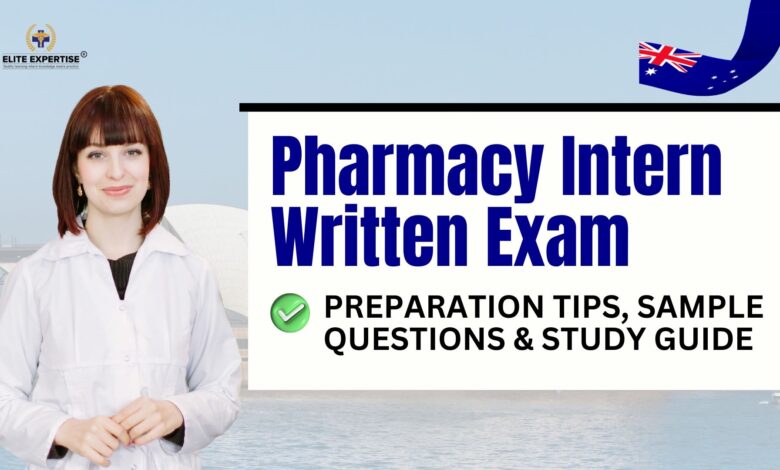Pharmacy Intern Written Exam: Preparation Tips, Sample Questions & Study Guide

Introduction
For an intern pharmacist who is working in Australian pharmacies, the final step to get the general registration is clearing the two exams for interns. They are Australian Intern written and oral examinations. With strategic preparation and scheduled study plan, interns can clear one of the most crucial steps toward achieving the general generation by passing the Australian Pharmacy Intern Written Examination, conducted by the Australian Pharmacy Council (APC). This exam is designed to assess the ability of an intern to apply clinical knowledge, pharmacy law, and professional judgment in their practice as a pharmacist to work safely and effectively.
For candidates who are preparing for the 2025 APC Intern Written Exam, this guide will give details regarding the exam format, major content areas, fees, and practical preparation tips and more
What is the Australian Intern Written Examination?
Candidates who completed 75% of their supervised inter hours can attempt the The Intern Written Exam. To be eligible, you must be provisionally registered as an intern pharmacist with the Pharmacy Board of Australia.
This exam evaluates whether you are ready to:
- Make safe, evidence-based medication management decisions
- Accurately dispense medicines in compliance with Australian laws
- Provide effective patient counselling
- Work within the legal, ethical, and professionally in Australian healthcare
Exam Format and Structure of Pharmacy intern written Exam
| Feature | Description |
| Eligibility | Provisional registration with the Pharmacy Board + ~75% supervised hours completed |
| Question format | 75 MCQs (67 scored and 8 unscored) |
| Duration of exam | 2 hours |
| Exam type | Computer based online exam |
| Interface Tutorial | 15 minutes before the exam |
| Exam fee | AUD 770.00 |
| Scoring Method | Rasch methodology – psychometric standard-setting |
| Results | Published ~3 weeks after the exam |
| Test Centres | Adelaide, Brisbane, Canberra, Darwin, Hobart, Melbourne, Perth, Sydney, Townsville |
Major Content Areas
The APC-approved syllabus for the intern written exam covers the following areas:
- Clinical Pharmacy – Managing common conditions, pharmacotherapy, adverse effects
- Legal & Ethical Practice – Dispensing regulations, PBS knowledge, documentation
- Communication & Counselling – Patient safety, cultural competence
- Pharmaceutical Calculations – Dosing, conversions, IV infusions
- Drug Interactions – Contraindications, monitoring parameters, safety checks
This broad coverage ensures you are tested on both theoretical knowledge and practical application.
Common Preparation Tips for the Intern Written Exam
With the right preparation and strategic approach, candidates can excel even in a competitive exam like the pharmacy intern written exam.
Let’s understand few tips and tricks to improve your preparation strategy
1. Have a grip on APC aligned Syllabus
Candidates must have a clear idea about the APC exam blueprint and align their study schedule according to the high-yield topics. This will ensure that the interns can complete the preparation efficiently without overload
2. Prepare a time table and schedule the time
Candidates should Dedicate at least 6–8 weeks for focused preparation. Break your time down by topic weightage:
- 60% – Therapeutics (e.g., cardiovascular, antibiotics, diabetes, mental health)
- 20% – Calculations
- 10% – Law and ethics
- 10% – Communication and counselling
3. Regular Practice of crucial topics like Calculations
Consider high-yield topics like calculation of Dosage and dilution which make up 15–20% of the exam. Daily practice will help to master IV infusion rates, conversions, and compounding problems.
4. Practice mock tests in Simulated condition of a Real Exam
Regular practice of full-length mock tests in a timed environment which mimics a real exam will improve the confidence and boost the preparation immensely. This also improves the speed, accuracy, and confidence.
5. Learn to use AMH, an Authorised Resources
The Pharmacy intern written exam is open-book, practice using the Australian Medicines Handbook (AMH) efficiently under timed conditions. This will save precious minutes during the exam.
6. Do frequent revisions
weekly revisions of high-yield topics will help candidates to have a good memory and understanding of core concepts.
7. Consider Professional Coaching
Joining a structured training program, like Elite Expertise, can significantly improve your chances. Their proven track record shows 90%+ success rates, making them a popular choice among pharmacy interns.
They offer:
- 1,000+ MCQs which is aligned with APC syllabus blue print
- Expert-led guidance from Australian accredited consultant clinical pharmacists, Mr. Arief Mohammad and Mrs. Harika Bheemavarapu
- Topic-wise mock tests with a timed simulated exam condition
- 3.5 months of High quality courses
- 24*7 admin assistance and networking with social media
Sample Questions
Here are some sample MCQs to give you a sense of the exam style:
Question 1:
A patient is prescribed Warfarin. Which of the following should be monitored regularly?
A) Blood glucose
B) INR
C) Blood pressure
D) Serum potassium
Question 2:
Which schedule of medicines in Australia contains controlled substances with accepted medical use but high potential for abuse?
A) Schedule 2
B) Schedule 4
C) Schedule 8
D) Schedule 9
Final Thoughts
The Australian Pharmacist Intern Written Exam is not just a test . It’s your gateway to becoming a fully registered pharmacist. By understanding the exam structure, focusing on high-yield topics, practicing calculations, and simulating real exam scenarios, you can approach exam day with confidence.
At Elite Expertise, we provide comprehensive exam preparation, mock tests, and personalised mentorship to help you succeed on your first attempt. Whether you’re looking for structured guidance or just a final revision boost, we’ve got you covered.
Start your preparation early, stay consistent, and you’ll be well on your way to achieving your goal of becoming a registered pharmacist in Australia.
